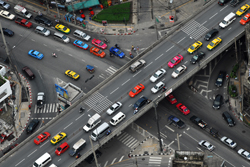Improving urban road user charging schemes
The scope of the Curacao project was to promote and support better and more efficient pricing of road usage in urban areas. It built on the work done by three previous projects: Cupid, Progress and Europrice - all concerned with urban road pricing. The Curacao project looked for best practices for a number of major themes within urban road user charging schemes. Several possible objectives were highlighted which included congestion relief, environment, economic and revenue growth as well as safety, health and liveability. Efficiency, environment and revenue generation were of primary importance. The effectiveness and acceptability of road user charging (RUC) schemes as well as the technology available for their support were looked at in detail. Examples included automatic number plate recognition (ANPR) and global navigation satellite systems like the global positioning system (GPS). Overall it was found that RUC schemes were effective in reducing traffic and therefore had a positive environmental impact. More investigation is needed regarding the impact on generating revenue. The main concern was acceptability by users which could be more likely if there were discounts and exemptions.




